The best rugged hard drive in 2024: top picks from our experts
Find the best rugged hard drive for your PC or Mac
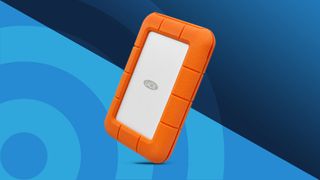
1. Quick list
2. Best overall
3. Best for speed
4. Best crush-resistant
5. FAQs
6. How to choose
7. How we test
When looking for the best rugged hard drive, prioritize devices known for outstanding durability and reliability.
The market for the best external hard drives includes many rugged variants engineered for advanced protection against damage. These rugged hard drives are designed not just for high capacity but to safeguard your data from the unexpected, offering features like water resistance, dust-proofing, and resilience to physical shocks.
Several top rugged hard drives come with military or aircraft-grade certifications such as IP68 and MIL-STD-810G, ensuring they can endure harsh conditions such as extreme weather, temperature variations, and even immersion in liquids. Their sturdy construction makes them essential for anyone regularly facing challenging environments, aligning them with other indispensable tools like the best rugged laptop, smartphone, and tablet.
Ideal for outdoor photographers, scientists working in tough terrain, or extreme sports enthusiasts, rugged hard drives protect your valuable data from physical mishaps and adverse elements. While the best portable SSDs may offer speed, rugged hard drives provide unparalleled data protection.
In selecting the right rugged hard drive, consider factors like cost, capacity, interface options, and critical protective features like dust and water resistance. Moreover, complement your data protection strategy with some of the best cloud storage solutions, as a backup since no device is completely indestructible.
The quick list
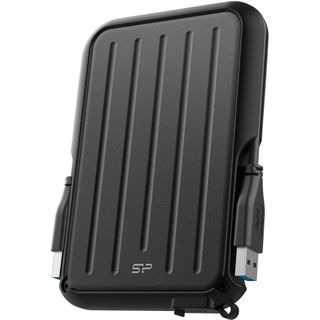
The Silicon Power A66 stands out for its cost-effectiveness rather than performance, offering 5TB of rugged, portable hard drive storage at a significantly lower price than faster SSDs, making it a solid choice for outdoor use.
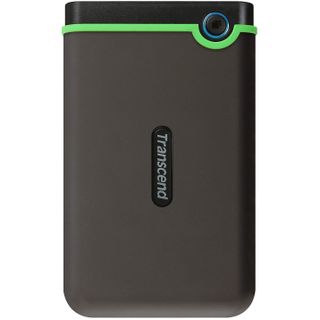
The Transcend StoreJet 25M3 rugged hard drive is well-protected with a silicone shell and reinforced case, meeting US Military drop-test standards. Ideal for travel, it features a quick reconnect button, USB 3.0 for fast transfers up to 5GB/s, and a convenient backup button.
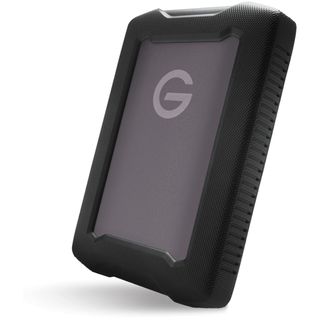
The G-Technology ArmorATD from Western Digital offers robust data protection with a rubber sleeve and aluminum enclosure, available in 1TB to 5TB sizes. It features three layers of shock resistance, can withstand up to 1000lb of crush force, and is rain and dust-resistant, though not fully waterproof.
The best rugged hard drive in 2024
Why you can trust TechRadar
Below you'll find full write-ups for each of the best rugged hard drive picks in our list. We've tested each one extensively, so you can be sure that our recommendations can be trusted.
The best rugged hard drive overall
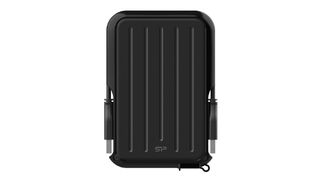
Specifications
Reasons to buy
Reasons to avoid
The Silicon Power A66 5TB portable, rugged hard drive nicely brings three critical attributes in anyone’s quest for storage perfection: It is significant. In terms of sheer capacity, it is relatively inexpensive compared to other rivals (like the Sandisk Professional G-Drive ArmorATD). It will protect your data better than most external hard drives if you don’t intend to immerse it in water (it is only IPX4 rated).
The A66 doesn’t come with any bundled software, and the cable it comes with is a special one (Type-A both ways, which makes replacing it problematic). In actual world tests, it performs in line with the rest of the HDD-based competition; expect to spend far more on a rugged SSD if you want something speedier, more resilient, smaller, and which can be used with a mobile device.
Read the full Silicon Power Armor A66 review.
The best rugged hard drive with USB 3.0
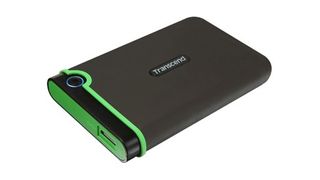
Specifications
Reasons to buy
Reasons to avoid
The Transcend StoreJet 25M3 is encased in three layers: a shock-absorbing silicone shell and a reinforced outer case. Like some of the others on the list of best rugged hard drives, it has also been drop-tested to US Military standards, and it shows.
This sturdy hard drive can take most knocks and drops - ideal if you often take your external hard drive traveling with you. It also has plenty of additional features, such as a quick reconnect button to ensure there arere no issues when you unplug it.
Moreover, the StoreJet 25M3's USB 3.0 compatibility gives data transfer speeds up to 5GB/s - comparable with internal drives. A 'back up button on the outer casing makes the process even quicker.
Read our full Transcend StoreJet 25M3 review.
The Best rugged hard drive for crush resistance
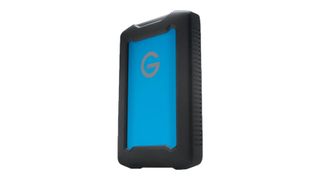
Specifications
Reasons to buy
Reasons to avoid
Western Digital’s G-Technology brand is no stranger to ensuring that your data is kept safe, and G-Technology ArmorATD does so by offering several layers of physical protection.
It features a rubber sleeve and a solid aluminum enclosure and is available in 1TB to 5TH versions. It boasts three layers of shock resistance and is crush resistant for up to 1000lb weight, making it a top companion for anyone who’s always out battling the elements.
The small print shows that this is valid for drops of up to 1.2m on a carpeted concrete floor for 1TB and 2TB capacities and up to 1m on a carpeted concrete floor for 4TB capacity. The latter has more platters which makes it a bit more fragile. Note that while it is rain and dust-resistant, it is not IP68, so don’t take it swimming with you.
Read our full G-Technology ArmorATD review.
The best rugged hard drive: FAQs
What is a rugged hard drive?
Rugged hard drives are like regular portable or external hard drives except that they are far more resistant to damage that would otherwise take a normal portable storage device out of commission. These devices are meant for extreme terrain and conditions, like construction sites, remote science outposts, and for military and paramilitary use. While you could use a rugged hard drive like a regular consumer device, rugged devices are usually more expensive owing to their many layers of extra protection and testing requirements.
Why are SSD so expensive?
Anthony Spence, Marketing Specialist at Silicon Power, answers this question
Solid state drives can seem expensive because they are costly to produce and have to compete with other components for production lines. One way of reducing cost has been to increase the number of bits per cell.
This is a surefire way to reduce costs and increase capacity but it has considerably negative effects on performance, reliability and endurance, the latter being super important if you want to use your drives for Chia farming or as NAS drives.
Each additional bit makes it more time consuming to read and write from a cell, voltage needs also grow and so does power consumption. With higher voltage comes higher temperatures, which facilitate a phenomenon called electron leakage and might lead to data corruption.
Furthermore, every bit added to the cells increases the need for comprehensive error correction technologies. These solutions contribute to the maintenance of good data integrity, however they do so at the cost of higher latency and lower random performance (usually measured in IOPS).
Despite the drawbacks mentioned, the sizable reductions in terms of costs and an ever growing storage capacity make up for a fair trade off. Nowadays, most consumers can gain access to the blazing fast speeds of SSDs at very low price points, with in some cases prices starting from well under $100 for nearly 1TB (e.g. the Silicon Power PC60).
It is important to remember that NAND cells aren’t the only element that has an effect on flash performance, things like the interface being used, over-provisioning (dedicating a portion of the available storage to the controller), SLC caching, controller, inclusion of DRAM, among others also play an important role.
As most purchases, in the end it all boils down the consumer and its specific needs. Just as QLC wouldn’t make the cut for a 5G provider looking for storage options for their base stations, SLC solutions would be overkill for the average consumer.
How to choose the best rugged hard drives for you
Although it may seem daunting trying to pick the best rugged hard drive from such a vast selection, there are three simple ways to narrow down the field.
Firstly, begin with budget. After all, if you've a set cost in mind you're not willing to spend a penny over, there's little point looking too deeply at devices that cost three times as much.
Once this has whittled down your choice, decide just how much storage you're going to require. If you're, for example, a full-time photographer or filmaker who regularly needs terrabytes of storage to backup your work on while out in the field, you'll need to look at the options that provide at least 1TB or 2TB of storage, possibly more.
Lastly, consider how and where you'll typically be using your hard drive. Presumably you're on the hunt for a robust and rugged version because you're either constantly on the move, working in the outdoors, or are just particularly clumsy. But does it need to be dust-resistant? Will it regularly be exposed to water? Consider these factors before making your choice on the best fit for you.
How we test the best rugged hard drives
In order to make our selection of best rugged hard drives we took several key factors into consideration. Cost was chief among them, or rather, value, as we judged which hard drives offer the most for their price.
As well as looking at each device's specs - such as storage capacity, portability, ease-of-use, connectivity options, and platform compatibility - we wanted to properly test the main selling point of each hard drive: its ruggedness. After all, if you're on this page, you're hunting for something that's going to last, even when severely tested.
And so we road-tested just how tough these hard drives are, analysing water and dust resistance, shock and drop proofing, and whether they boasted standardised certifications (such as IP68).
Get in touch
- Want to find out about commercial or marketing opportunities? Click here
- Out of date info, errors, complaints or broken links? Give us a nudge
- Got a suggestion for a product or service provider? Message us directly
- You've reached the end of the page. Jump back up to the top ^
Are you a pro? Subscribe to our newsletter
Sign up to the TechRadar Pro newsletter to get all the top news, opinion, features and guidance your business needs to succeed!
Former TechRadar Pro B2B Hardware Editor, Collin has been in journalism for years, with experience in small and large markets, including Gearadical, DailyBeast, FutureNet, and more.
- Matt HansonManaging Editor, Core Tech
- John LoefflerComponents Editor

